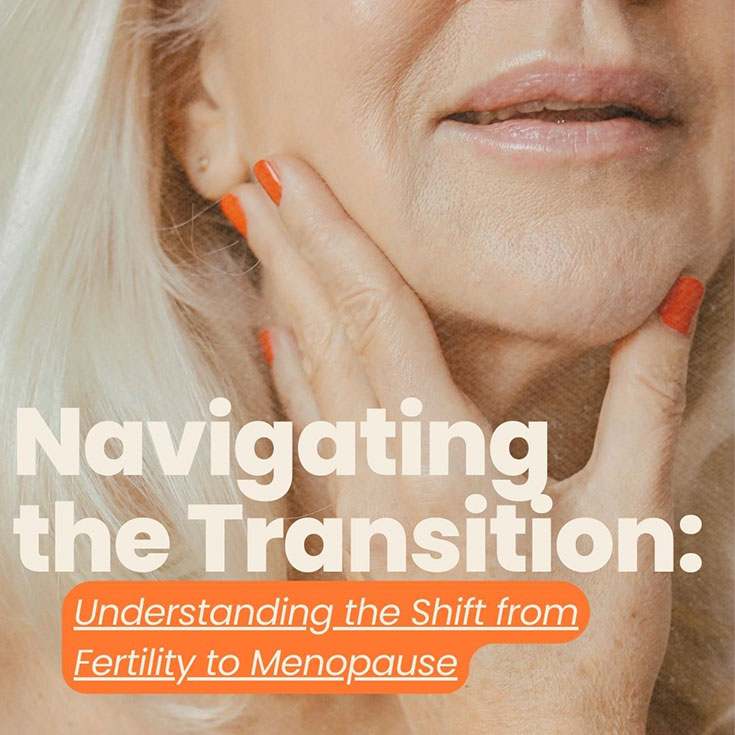As women’s bodies undergo numerous changes throughout their lives, signifying different stages of growth and development. Among these, the transition from fertility to menopause stands out as a significant phase, marking the end of a woman’s reproductive years. However, this transition isn’t always straightforward and can sometimes be confused with other conditions, such as pregnancy, due to overlapping symptoms. In this comprehensive guide, we’ll explore the nuances of this transition, offering insights, tips, and support for women navigating this complex journey.
Understanding the Basics of Menopause and Fertility
Menopause is a natural biological process that marks the end of a woman’s menstrual cycles and fertility. It’s diagnosed after 12 consecutive months without a menstrual period and typically occurs in women in their late 40s to early 50s. However, the journey towards menopause, known as perimenopause, can begin several years earlier when symptoms gradually start to appear. This period can vary greatly among women in terms of age onset and symptom severity.
Understanding the basics of menopause is crucial for recognizing its onset and differentiating it from other conditions, such as pregnancy. Menopause signifies a significant shift in the hormonal balance, primarily involving estrogen and progesterone, hormones that regulate menstruation and ovulation. This shift can have a broad impact, affecting not only reproductive health but also bone density, heart health, and more. By educating ourselves on these changes, women can better prepare for and manage the transition, ensuring a smoother shift into this new stage of life.
Common Symptoms of Menopause and Pregnancy
Both menopause and pregnancy share a range of symptoms, including missed periods, mood swings, and changes in hormonal levels, which can lead to confusion in diagnosing. Here, we delve into the common symptoms of each, highlighting how to distinguish between the two.
- Missed periods: In menopause, missed periods become progressively more frequent, eventually stopping altogether. In pregnancy, a missed period is often the first sign and continues throughout the pregnancy.
- Mood swings: Hormonal changes during menopause can cause emotional roller coasters similar to those experienced during pregnancy. However, the triggers and duration of these mood shifts can differ.
- Hormonal fluctuations: Both stages involve significant changes in hormone levels, though the specific hormones and their impacts vary. A decrease in estrogen and progesterone characterizes menopause, while pregnancy sees an increase in these hormones.
- Hot flashes (more common in menopause): A hallmark of menopause, hot flashes are sudden feelings of warmth that spread through the body, which are not typically experienced during pregnancy.
- Nausea (more often associated with pregnancy): While nausea is most commonly associated with the early stages of pregnancy, some women in perimenopause may also experience it due to hormonal fluctuations.
- Breast tenderness: This symptom can occur in both menopause and pregnancy but is usually more pronounced in the early stages of pregnancy.
The Importance of Accurate Diagnosis
Accurately diagnosing the transition to menopause is crucial for managing health and well-being. Misinterpreting these signs could lead to unnecessary stress or overlooking important health considerations. For instance, attributing menopausal hot flashes to a fever or other illnesses could delay appropriate treatment or lifestyle adjustments that alleviate symptoms.
We discuss the importance of consulting healthcare professionals for accurate diagnosis and guidance. A healthcare provider can offer various diagnostic tools, such as blood tests to measure hormone levels, confirm menopause, and rule out pregnancy or other health conditions with similar symptoms. This step is vital for peace of mind and planning and implementing strategies to manage symptoms effectively.
Managing Symptoms and Seeking Support
Managing the symptoms of menopause requires a holistic approach that encompasses lifestyle changes, dietary adjustments, and, sometimes, medical interventions. For example, regular exercise and a balanced diet rich in calcium and vitamin D can help mitigate bone density loss, a common concern during menopause. Additionally, practices like yoga and meditation can reduce stress and manage mood swings effectively.
Equally important is seeking support from communities and professionals who understand the intricacies of this phase. Support groups, either online or in-person, can offer invaluable spaces for sharing experiences and tips. Healthcare professionals specializing in menopausal health can provide personalized advice and treatment options, including hormone replacement therapy (HRT) if suitable.
Moreover, embracing a positive mindset towards menopause as a natural and empowering phase of life can significantly impact how symptoms are perceived and managed. By fostering a supportive environment, sharing knowledge, and accessing professional guidance, women can navigate the challenges of menopause with confidence and grace.
There are numerous resources available for women seeking guidance during this transition. Organizations and websites offer valuable information, support groups, and forums for sharing experiences and advice, which provide insights and support for women navigating the complex symptoms associated with both pregnancy and menopause.
Embracing the Change: A Positive Outlook
Transitioning into menopause is a significant phase in a woman’s life that, while challenging, can be embraced positively. With the right information, support, and mindset, women can navigate this transition with confidence and grace, seeing it as a new chapter of freedom and self-discovery.
The journey from fertility to menopause is a unique experience for every woman, filled with its own set of challenges and triumphs. Understanding the transition, recognizing the symptoms, and seeking the right support are key steps in navigating this phase with ease and confidence. While it may seem daunting at times, this transition marks a period of significant personal growth and empowerment for women. By embracing change and utilizing resources like JoinMidi, women can approach menopause with the knowledge and support they need to thrive during this new stage of life.






Speak Your Mind